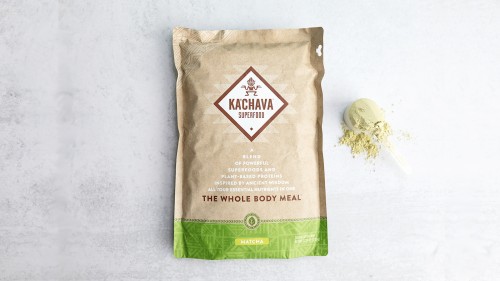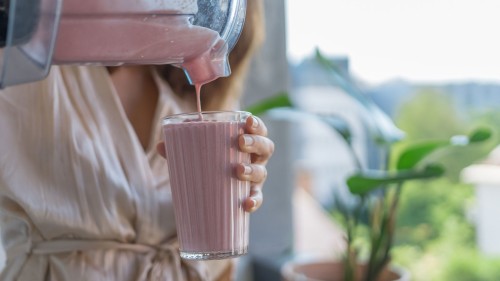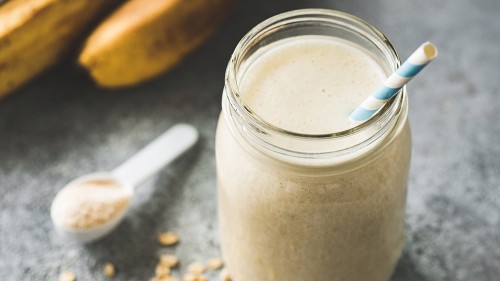WellnessVerge is reader-supported. We may earn a commission when you make a purchase through the links on this page. Learn more about our process here.
Soylent Review: A Dietitian’s Expert Take
Published on October 19, 2021
Medically Reviewed by Ana Reisdorf, MS, RD
Soylent is a meal replacement beverage designed to provide complete nutrition. It’s not for everyone, since it contains soy, a common food allergen, and there is little evidence to support all the health claims surrounding this product.


|
Pros
|
Cons
|
What Is Soylent?
Soylent is a plant-based meal replacement product and is available as a powder or as a ready-made drink. Soylent also makes snack bars.
In this review, I’ll be focusing on Soylent Powder, but I’ll also provide a comparison of the entire product line.
Soylent claims their meal replacement products provide complete nutrition with a balanced ratio of fat, protein, and carbohydrates, as well as 28 vitamins and minerals and omega-3 fatty acids.
They also claim the powder and drinks provide sustained energy, enhance hydration, boost metabolism, and support muscle, heart, and immunity.
Each serving of Soylent Powder provides 400 calories with a macronutrient ratio of 37% carbohydrate, 20% protein, and 43% fat.
These meal replacement drinks are designed as a way to fuel your body with convenience in mind.
It was created by Silicon Valley engineers who set out to develop a well-balanced meal replacement because they felt obtaining and preparing food was too “burdensome.”
Soylent recommends using their products to replace occasional meals and help you meet your nutrition needs.
The powder provides a balanced and convenient way to fuel yourself when you’re short on time.
An Overview of the Soylent Product Line
Here’s a summary of the Soylent product line:
Soylent Powder
Soylent Powder is available in two flavors — original or cacao. It’s prepared by mixing with water, and the package includes instructions for either an 8-ounce or 12-ounce serving.
An 8-ounce serving of Original Soylent Powder provides:
- Calories: 270
- Fat: 13 grams
- Protein: 13 grams
- Fiber: 4 grams
- Added sugar: 10 grams
- 15% Daily Value for 28 vitamins and minerals
A 12-ounce serving of Original Soylent Powder provides:
- Calories: 400
- Fat: 19 grams
- Protein: 20 grams
- Fiber: 6 grams
- Added sugar: 15 grams
- 20% Daily Value for 28 vitamins and minerals
It’s important to note that an 8-ounce serving doesn’t provide enough calories to be considered a meal replacement.
Only the 12-ounce serving size is comparable to the Soylent Complete Nutrition ready-made drinks.
Soylent Complete Meal Drink
Soylent Complete Meal is essentially Soylent Powder in ready-to-drink form.
It’s available in more flavors than Soylent Powder, including original, chocolate, vanilla, mint chocolate, mocha, chai, strawberry, and banana.
Compared to the powder, the drinks contain the same number of calories, protein, and both provide 20% of the Daily Value for 28 vitamins and minerals.
This ready-to-drink product contains more fat, less fiber, and less added sugar than the powder one.
Each bottle contains 14 ounces and is gluten-free, dairy-free, nut-free, and vegan.
One serving provides:
- Calories: 400
- Fat: 24 grams
- Protein: 20 grams
- Fiber: 3 grams
- Added Sugar: 1 gram
- 20% Daily Value for 28 vitamins and minerals
Soylent Complete Protein Drink
Soylent Complete Protein is another ready-made drink. Unlike the Complete Meal Drink, it’s considered a “nutrition shake” instead of a meal replacement.
Complete Protein contains more protein and fewer calories and fat than Complete Meal.
Complete Protein is available only in chocolate. Each bottle contains 11 ounces and provides:
- Calories: 250
- Fat: 13 grams
- Protein: 30 grams
- Fiber: 3 grams
- Added sugar: 0 grams
- 28 vitamins and minerals
Soylent Complete Energy Drink
Soylent Complete Energy is a ready-made drink designed to energize and improve brain focus.
Each serving contains 100 milligrams of caffeine and 100% of the Daily Value for B vitamins niacin, riboflavin, B6, B12, and pantothenic acid.
B vitamins are involved in metabolism and the cellular production of energy.
Complete Energy also contains amino acids L-theanine and L-tyrosine and alpha-glyceryl phosphorylcholine, which is a compound found in the brain believed to support memory and focus.
Complete Energy is not intended to be used as a meal replacement, and it contains fewer calories, fat, and protein than Complete Meal and Complete Protein.
Each bottle contains 11-ounces and provides:
- Calories: 180
- Fat: 10 grams
- Protein: 15 grams
- Fiber: 3 grams
- Added sugar: 3 grams
- 28 vitamins and minerals
Soylent Squared
Soylent Squared is a complete nutrition snack bar made from plant-based ingredients. The bars are gluten-free, dairy-free, and vegan.
They’re available in two flavors – chocolate brownie or peanut butter chocolate chip.
Each bar costs roughly $1 and provides:
- Calories: 100
- Fat: 5 grams
- Protein: 6 grams
- Fiber: 2 grams
- Added sugar: 1 gram
- 28 vitamins and minerals
Evaluation of Ingredients
Soylent Powder and Complete Meal Drinks are considered nutritionally complete with balanced macronutrients.
They contain carbohydrates for energy and protein, fat, and fiber to help you feel full and prevent blood sugar spikes.
They also contain a vitamin and mineral premix that provides 28 vitamins and minerals.
The main ingredients in Soylent Powder that make up the macronutrient distribution are soy protein isolate, canola oil, maltodextrin, isomaltulose, and soluble corn fiber.
Soylent Powder also contains natural flavors and sucralose, an artificial sweetener, for flavor and sweetness.
Soy Protein Isolate
As the name suggests, the primary source of protein in Soylent is soy protein isolate, which comes from soybeans.
Soy protein is considered a complete protein because it contains all nine essential amino acids. Essential amino acids cannot be produced by the body and must be obtained from food. (1)
Soy protein is easily digested and absorbed. (2)
Compared to many protein drinks that utilize whey protein, soy protein is safe and acceptable for vegetarians, vegans, and individuals with lactose intolerance to consume.
Summary
Soy protein is a complete protein that is easy to digest and acceptable for most dietary preferences.
Canola Oil
Canola oil is the primary source of fat in Soylent Powder.
Canola oil is sourced from a plant called rapeseed. It primarily contains monounsaturated and polyunsaturated fatty acids and is low in saturated fatty acids.
Canola oil is used in Soylent to provide calories and enhance satiety. It also provides omega-3 (alpha-linolenic) and omega-6 (linoleic) fatty acids. (3)
Both types of fat are needed for good health; however, most people consume too many omega-6 fatty acids relative to omega-3 fatty acids.
Canola oil contains more omega-6 than omega-3 in a ratio of about 2:1. (4)
Consuming too many omega-6 fatty acids in relation to omega-3 is a key factor in developing inflammatory diseases, including obesity and heart disease. (5)
Canola oil is a controversial ingredient in the wellness world because many rapeseed crops are genetically modified.
Also, the oil is subject to chemical solvents during production, and heat used during processing can turn the oil rancid.
Summary
Canola oil is high in omega 3 and 6 fatty acids, which have specific benefits, but it doesn’t come without controversy due to genetic modification and processing.
Maltodextrin
Maltodextrin is sourced from plant starch and spray-dried to be added to food products. It’s often found in processed foods.
Maltodextrin is rapidly digested and absorbed to provide energy to the body in the form of glucose, and it is one of the primary carbohydrate sources in Soylent. (6)
A 2019 study suggests that maltodextrin intake contributes to intestinal inflammation, altering the microbiome, impacting nutrient absorption, and resulting in digestive disorders. (7)
Summary
Maltodextrin is a type of starch that may have a negative impact on the digestive tract.
Isomaltulose
Isomaltulose is a type of carbohydrate that contains glucose and fructose. It is considered well tolerated by humans. (8)
Unlike typical dietary sugars, isomaltulose is slowly digested, so it doesn’t result in rapid blood sugar and insulin spikes like sugar.
This quality makes the ingredient popular as a sugar replacement in commercial food products.
Summary
Isomaltulose is used in Soylent to provide carbohydrates and energy.
Soluble Corn Fiber
Soluble corn fiber is sourced from corn starch, and it’s used in Soylent as a source of fiber. (9)
Soluble fiber like that found in soluble corn fiber can help increase satiety and add bulk to stool, which may reduce constipation and diarrhea and lower cholesterol levels. (10)
There is evidence that soluble corn fiber acts as a prebiotic. (11)
Prebiotics are a food source for the good bacteria that live in your intestines. Regularly consuming prebiotics can support digestive health and the immune system.
Summary
Soluble corn fiber helps increase satiety and may have benefits for the digestive system.
Support for Claimed Benefits
Below is our summary of the available evidence for the claimed benefits of Soylent based on the available research:
| Provides sustained energy and satiety | 4/5 |
| Supports strength and muscle health | 4/5 |
| Supports heart health | 3/5 |
| Supports immune system | 3/5 |
| Hydrates | 3/5 |
| Boosts metabolism | 1/5 |
Soylent contains a balance of carbohydrates, protein, and fat to provide sustained energy and satiety.
This product’s fat, protein, and fiber content contributes to satiety and slow blood sugar rise that prevents you from feeling hungry again soon after eating.
The product contains 20 grams of protein per serving, which can support strength and muscle health in conjunction with exercise and strength training.
Canola oil and fiber in Soylent may support heart health.
Canola oil is a source of omega-3 and omega-6 fatty acids, which benefit heart health, and soluble corn fiber may help lower cholesterol levels.
Soluble corn fiber is a prebiotic that supports a healthy digestive environment. In turn, a healthy microbiome supports a healthy immune system.
Soylent also contains 28 vitamins and minerals that play a role in immunity.
Because Soylent Powder is mixed with water, it contributes to daily hydration needs. However, one serving alone does not contain enough fluid to meet anyone’s daily needs.
There is no evidence that the ingredients in Soylent will result in boosted or enhanced metabolism.
Side Effects, Safety, and Dosage
Soylent Powder and Complete Meal Drinks can be used any time of day.
One serving is one 12-ounce ready-made drink or ½ cup powder mixed with 1 cup of water, or 2/3 cup powder mixed with 1.5 cups of water.
Soylent is safe for most people to consume with little concern for significant side effects.
Some users report mild digestive upset, like gas and bloating, after drinking Soylent. However, there’s no evidence that this is a common side effect of the product.
Soylent contains soy, a common food allergen, so it shouldn’t be consumed by anyone with an allergy or intolerance to soy.
Some Soylent products contain caffeine, which may be a concern for stimulant-related side effects for caffeine-sensitive individuals.
Soylent claims the ready-to-drink Complete Meal Mocha flavor contains about 150 milligrams of caffeine and the ready-to-drink Complete Meal Chai flavor contains about 30 milligrams of caffeine.
Soylent is made from plant-based products, so it’s acceptable for vegetarians and vegans to consume.
Please speak with your primary healthcare provider before trying Soylent to make sure it’s safe and acceptable for you.
Cost and Where to Buy
Soylent products are available through the brand’s website, grocery stores, and large retailers, like Amazon, Walmart, and Walgreens.
The cost of Soylent products will depend on which retailer you purchase from and whether it’s on sale. Powdered Soylent costs $64 per case on the Soylent website.
There are five pouches of powder per case, and each pouch contains seven servings for a total of 35 meals in each case. However, it’s important to note that Soylent is basing the number of servings per bag and case of powder off an 8-ounce serving.
As previously mentioned, an 8-ounce serving of Soylent Powder only provides 270 calories, which probably isn’t enough to satisfy most people as a meal.
If you’re using Soylent Powder to prepare the larger, 12-ounce serving, you’ll get fewer servings out of each pouch and case. By my estimate, you’ll get about five 12-ounce servings out of each pouch and 25 servings out of each case.
The cost per 8-ounce serving is approximately $1.83. The cost per 12-ounce serving is roughly $2.56.
I also found 36.8-ounce tubs of Soylent powder on Amazon. Each tub contains 18 meals and is priced at $34, or $1.88 per meal.
The ready-to-drink Soylent is sold in bundles of 12 bottles.
On the Soylent website, Complete Meal Drinks cost $42 for 12 bottles ($3.50 per bottle).
The Complete Protein and Complete Energy Drinks cost $33 for 12 bottles ($2.75 per bottle).
On Amazon, the prices of Soylent Complete Meal Drinks depend on the flavor, and I found 12 bottles cost anywhere from $35 to $42.
The Soylent website offers a discount if you sign up for a subscription to any of their products, but they do not offer a return or exchange policy. Soylent products purchased from other retailers may be subject to different return policies.
Soylent Powder is much more affordable than the ready-to-drink Complete Meal.
You’ll get fewer servings of Soylent Powder than the label indicates if you use it to prepare 12-ounce servings. That cost per meal will also be higher with 12-ounce servings.
Still, Soylent meal replacement products cost less than most drive-thru meals, making them a better choice for both your body and wallet.
How Soylent Compares to Huel
There are many different protein shakes and meal replacements on the market with varying nutritional content and protein sources.
Huel is a “complete nutrition” meal replacement, like Soylent. It’s available in either powdered or ready-made form, is easy to prepare, and is relatively affordable.
The primary protein source in Huel is pea protein. It’s free from soy and dairy but contains coconut, which is another potential allergen.
The ingredient list for Huel also contains oats, flaxseed, brown rice protein, coconut MCTs, and sunflower oil. Compared to Soylent, the ingredients are more recognizable and reminiscent of whole foods.
Huel provides 400 calories per serving, which is the same as a serving of Soylent. However, the macronutrient breakdown is different.
Huel has more protein and less fat per serving compared to Soylent.
Huel also provides more vitamins and minerals than Soylent and contains prebiotics and probiotics to support digestive health.
Huel costs slightly more than Soylent. Huel Powder costs about $1.91 per meal versus Soylent Powder at $1.83 per meal.
Huel ready-to-drink costs $3.71 per bottle versus Soylent Complete Meal Drinks at $3.50 per bottle.
If soy is a concern for you, I’d recommend trying Huel over Soylent.
Frequently Asked Questions
Can you lose weight on Soylent?
Soylent isn’t designed or marketed to be a weight loss product or system. Soylent could theoretically be included on a weight loss plan as long as you’re eating within a calorie deficit each day.
Since Soylent provides a set number of calories and macronutrients in each serving, it would be easy to track as part of your overall day.
Is Soylent actually good for you?
Soylent provides a mix of carbohydrates, fat, and protein, and contains 28 vitamins and minerals, which is considered balanced and healthy.
Compared to many fast food and convenience meals, Soylent is a nutritionally better choice.
But is it better for you than a well-balanced home-cooked meal? Not really.
Is Soylent low carb?
No, Soylent products contain too many carbohydrates per serving to be considered low carb.
Is Soylent good for keto?
No, Soylent products contain too many carbohydrates per serving to be considered keto-friendly.
How many meals can I replace with Soylent?
Technically, you could replace one or more meals a day with Soylent powder or Complete Meal drink. The makers of Soylent recommend replacing occasional meals with either of these products.
I’d recommend using these products to replace breakfast or lunch on busy days when you don’t have time to cook or sit down and eat.
Soylent Complete Protein and Complete Energy drinks should not be used to replace meals since they’re lower in calories.
Which Soylent flavor is best?
The flavor you like best depends on personal preference.
Many users rank cacao/chocolate as their favorite.
If you’d like to try several flavors, the Soylent website and Amazon offer variety packs.
Does bottled Soylent go bad? How long is Soylent good for?
According to the company, unopened products have a shelf-life of one year and are safe to consume past the “Best By” date on the package.
The products shouldn’t spoil, but the vitamin and mineral content may degrade with time.
The Bottom Line
Soylent is a meal replacement product that balances carbohydrates, protein, and fat and provides 28 vitamins and minerals.
You can drink meal replacement products like Soylent occasionally, but not regularly.
Plus, drinking your meals can grow tiresome and leave you feeling deprived of actual solid food.
Soylent Powder and Complete Meal Drink can be useful for some individuals who need quick nutrition due to busy lifestyles.
Soylent is a good option compared to other fast food and convenience meals.
Although Soylent contains a nice balance of carbohydrates, protein, and fat, it doesn’t offer enough variety.
Also, it lacks the quantity of fiber, antioxidants, and phytochemicals found in whole fruits, vegetables, and other plant foods.
If you can get past that, Soylent offers decent, nutritionally sound meals at an affordable price.
At WellnessVerge, we only use reputable sources, including peer-reviewed medical journals and well-respected academic institutions.
- Biochemistry, Essential Amino Acids:
https://www.ncbi.nlm.nih.gov/books/NBK557845/ - Soy and Health Update: Evaluation of the Clinical and Epidemiologic Literature:
https://www.ncbi.nlm.nih.gov/pmc/articles/PMC5188409/ - Hunger and satiety responses to high-fat meals after a high-polyunsaturated fat diet: A randomized trial:
https://pubmed.ncbi.nlm.nih.gov/28760423/ - Evidence of health benefits of canola oil:
https://www.ncbi.nlm.nih.gov/pmc/articles/PMC3746113/ - An Increase in the Omega-6/Omega-3 Fatty Acid Ratio Increases the Risk for Obesity:
https://pubmed.ncbi.nlm.nih.gov/26950145/ - Nutrition, Health, and Regulatory Aspects of Digestible Maltodextrins:
https://www.ncbi.nlm.nih.gov/pmc/articles/PMC4940893/ - Maltodextrin, Modern Stressor of the Intestinal Environment:
https://www.ncbi.nlm.nih.gov/pmc/articles/PMC6409436/ - Isomaltulose (Palatinose): a review of biological and toxicological studies:
https://pubmed.ncbi.nlm.nih.gov/12387299/ - The Role of Soluble Corn Fiber on Glycemic and Insulin Response:
https://www.ncbi.nlm.nih.gov/pmc/articles/PMC7231297/ - “Dietary fibre”: moving beyond the “soluble/insoluble” classification for monogastric nutrition, with an emphasis on humans and pigs:
https://www.ncbi.nlm.nih.gov/pmc/articles/PMC6537190/ - Prebiotic Potential of a Maize-Based Soluble Fibre and Impact of Dose on the Human Gut Microbiota:
https://www.ncbi.nlm.nih.gov/pmc/articles/PMC4701468/






